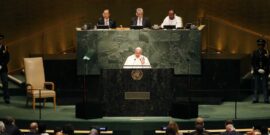Should Olympic athletes keep silent about China's outrages against the Uyghurs?
Rights, Duties, and the Universal Declaration of Human Rights at 75
Rights have gone off the rails. The anniversary of the Universal Declaration of Human Rights is a fitting occasion to consider how they were derailed and how they may be placed back on track. The Declaration contains both the source of the problem and the intellectual resources to fix it. Crafted amidst the echoes of a classical jurisprudential tradition that associated rights with just action, the Declaration rests partly on a solid foundation of natural justice. But it was also built amidst the optimistic obsessions of a modern time and its footings awkwardly reach over looser soil.
Modern Rights Talk
Rather than directing us to reason together and act justly toward each other, contemporary “rights talk” (the term that Harvard emerita professor Mary Ann Glendon influentially used to describe what now passes for civic discourse) directs us to shut up and get on board with elite social assumptions. Many assertions of human rights circulating today are in fact mere assertions of desire. Not all desires count equally. Rational desires for the good, the true, and the beautiful are minimized. The human rights industry privileges the appetites of adults over the needs of children, immediate fears over enduring institutions, and the preoccupations of myopic experts over practical wisdom.
That is not the only problem. Our rights commissars also equate contingent entitlements with true human rights. Entitlements to high-paying jobs and Internet access are placed on the same rhetorical and jurisprudential level as universal rights not to be murdered and enslaved. Supreme Court justices and their ardent admirers in the press, academy, and bar use the same words to describe legal immunities for abortionists which thoughtful jurists use to describe the right not to be killed intentionally and the dignity of republican self-government. This inflation of contingent entitlements devalues true human rights.
True Rights Are Reasons for Action
The problem is not with rights. The concept of rights is not a modern innovation springing from an ideology of radical individualism and opposed to the common good, as some conservatives have mistakenly charged. For centuries, our jurisprudence identified rights as the reasons we have to act justly toward other people. To read Cicero, Justinian, William Blackstone, James Wilson, Robert Jackson, and John Finnis is to be immersed in a jurisprudential tradition in which rights function to direct our practical reasoning toward the ends of natural and legal justice.
A true right is a type of what moral and legal philosophers call reasons for action. A right is an especially binding and conclusive reason to act or refrain from acting in some particular way toward some particular person. The point of view from which rights have meaning is that of the duty bearer, the person who is obligated to do what is right. From that perspective—call it the practical point of view—we can distinguish between genuine human rights and contingent imposters. True human rights tell us what we owe to each other, what we must in justice do and refrain from doing, and to whom we owe our various duties.
Rights correlate with and identify the content of duties that persons owe to other persons. To take a simple example, suppose that we make a contract: I will pay you $5 for a turkey sandwich. If you perform the contract by delivering a sandwich to me then you now have a right to be paid $5 by me, which is to say that I have a duty to pay $5 to you.
Not all rights are that particular. Rights may be reasons of either natural justice—natural rights—or legal justice—legal rights. Rights of natural justice are the same for everyone in all circumstances. The rights not to be murdered, slandered, maimed, tortured, or enslaved are all examples of natural rights. Every human being has these rights.
Some natural rights are universal also for those who must obey them. Our duties to honor the absolute, natural rights of others are not contingent upon our circumstances, our relationships, or our prior promises and commitments. Because such rights always correlate with duties to refrain from committing certain actions—duties of abstention—all of us can honor and obey natural rights simply by doing nothing.
Nor are natural rights contingent on law. Everyone has the natural right not to be slandered or libeled even in the United States, whose Supreme Court forbids states to enforce the common law of defamation. Everyone has the right not to be enslaved even in states that tolerate slavery.
The Universal Declaration contains many apt expressions of true human rights. If we will attend to the juristic tradition that gave us its best features then we can again use rights to achieve justice in our communities.
Rights in the Universal Declaration
Many provisions of the Universal Declaration reflect this classical conception of human rights as universal reasons for action.
- Article 4: “No one shall be held in slavery or servitude; slavery and the slave trade shall be prohibited in all their forms.”
That is to say that every person bears a duty not to enslave any other person.
- Article 5: “No one shall be subjected to torture or to cruel, inhuman or degrading treatment or punishment.”
That is to say that every person bears a duty not to torture any other person.
Notice that the duties that correlate with those universal rights are duties to refrain from action. All truly universal rights correlate with duties of abstention because only duties not to act can be owed by all persons to all persons in all circumstances. By contrast, duties to provide some good or benefit to another person are always contingent on the availability of time and resources; the lack of prior, competing obligations; consistency with other legal duties; and much else.
What Went Wrong?
Modern rights discourse first went wrong when it began placing entitlements to desirable things on the same jurisprudential track as true human rights. Note that in my earlier example your right to $5 was contingent on our contract and your performance. You have no right to collect $5 in the abstract. You may desire, long for, even desperately need $5. You may have plans to spend the money on something truly good. But the desirability or value of the money does not alone justify its assertion as a right against any person or community of persons. You must prove a legal right.
In contrast to natural rights, legal rights and other conventional entitlements are not the same for everyone, everywhere, in all circumstances. Because most practical problems can be solved in a variety of ways consistent with natural reason, and because most solutions are contingent upon a host of particular circumstances and facts on the ground, rights to have good things must be made particular and concrete by some coordinated human action or institution, such as custom, promise, or law.
Modern rights discourse takes a shortcut past legal rights. It stipulates the desirability of some end and then confers on it the status of a human right. This does not move practical reasoning toward just conclusions. Rather, it detours practical reasoning toward politically- and culturally-privileged ends, always at the expense of other human goods, and usually to the injury of law.
Unfortunately, the Universal Declaration contains some assertions of this mistaken sort. For example, Article 15 declares, “Everyone has the right to a nationality.” To adopt the practical point of view is to see that the statement is obviously false. Imagine a group of people living in primitive conditions on a remote island who have no national identity, no national conventions, and no institutions that function like a state. Who has a duty to give them a nationality? By what means? By what authority? There are no universal answers to such questions.
In this way, the Universal Declaration started modern rights discourse down a wrong track. The Declaration went further off course by reversing the practical perspective of rights from the acting person to the right bearer. Alongside true natural rights such as the duty of the state to protect the natural family (Article 16) and the duty never to compel any person to belong to an association (Article 20), the Declaration lists contingent entitlements such as rights to “social security” (Article 22) and “protection against unemployment” (Article 23).
Demands for desirable ends as rights trade on the prestige of natural rights. The assertion of a good thing as a human right makes the demand look more universally justified than it is. Every person has desires, and many of those desires are rational, oriented toward good ends. That is what the so-called rights of education and universal healthcare have in common with true natural rights, such as the rights not to be killed and enslaved. But that is all that they have in common. The verbal formula “a right to an education” does not answer any of the practical questions that we must answer if such a right is to have any meaning in our practical deliberations, choices, and action.
Post-modernists made the next wrong move, conflating sub-rational desires with rationally-desirable goods in the prioritization of human rights. In critical theories, rights turn inward to focus on subjective experiences and desires. When the desires of elites require acting unjustly toward politically marginalized human beings, such as unborn babies and religious minorities, the putative champions of human rights clothe unjust acts of wrongdoing in the rhetorical cloak of rights.
The point at which we went off track is also the point from which we can move in the right direction. The Universal Declaration contains many apt expressions of true human rights. If we will attend to the juristic tradition that gave us its best features then we can again use rights to achieve justice in our communities.



